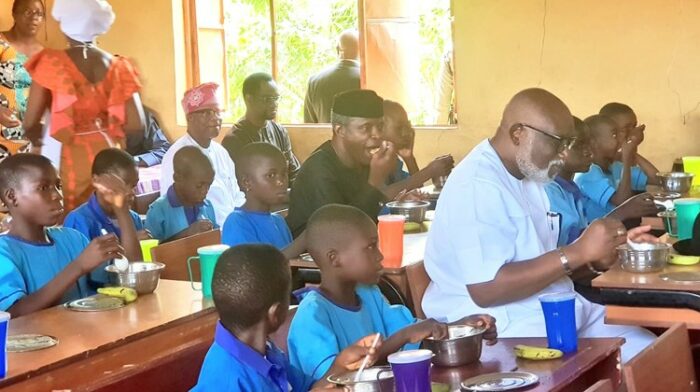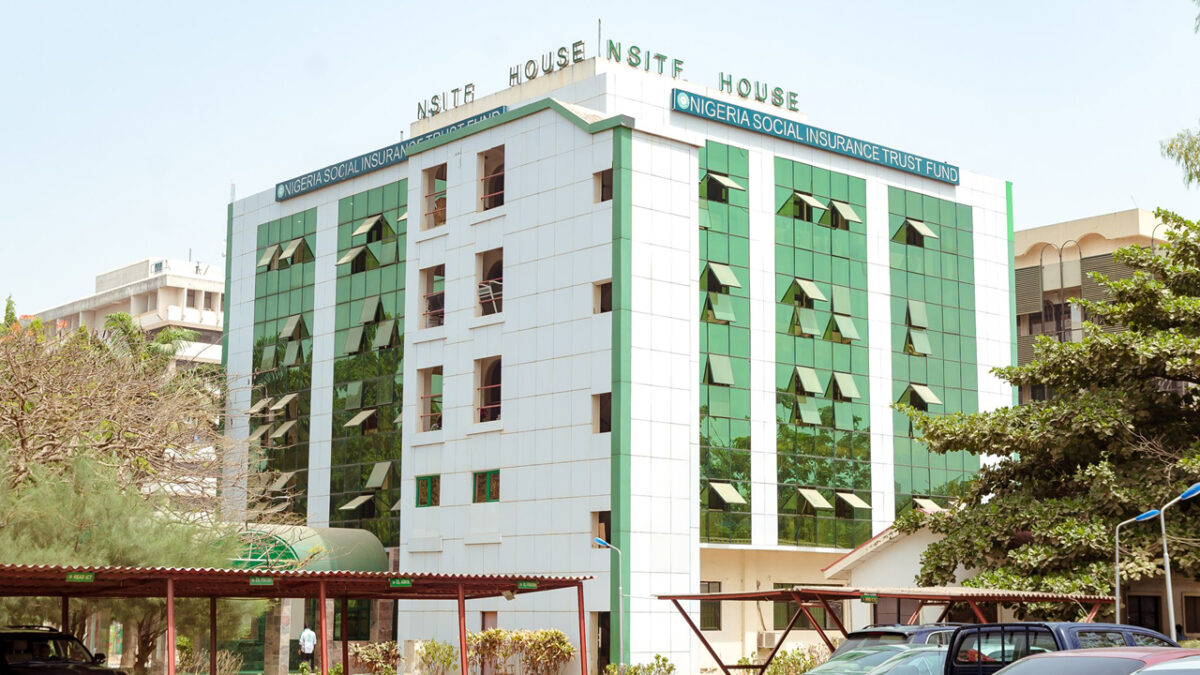Before the exit of former President Muhammadu Buhari from office on May 29, he signed into law the 2023 budget tagged the ‘Budget of Fiscal Sustainability and Transition’ on January 3, 2023.
Some highlights of the budget made provisions for debt servicing, defense and internal security, health sector and education, among others.
In the budget, a total of ₦355,093,601,378 was allocated to the Ministry of Humanitarian Affairs, Disaster Management and Social Development. Out of this sum, about ₦1 billion was appropriated for the National Home-Grown School Feeding Programme (NHGSFP).
This budgetary allocation is yet to have an impact on the children, as six months after, primary school students nationwide are yet to taste even a drop of cooking oil. The implication of this is telling on the welfare and educational needs of the growing number of out-of-school children.
FIJ placed calls to the three numbers – 08024175445, 08028216336, 080131638164 – of the Ministry of Humanitarian Affairs, Disaster Management and Social Development to find out why the programme had failed to deliver meals to beneficiaries of the programme, but none was reachable at press time.
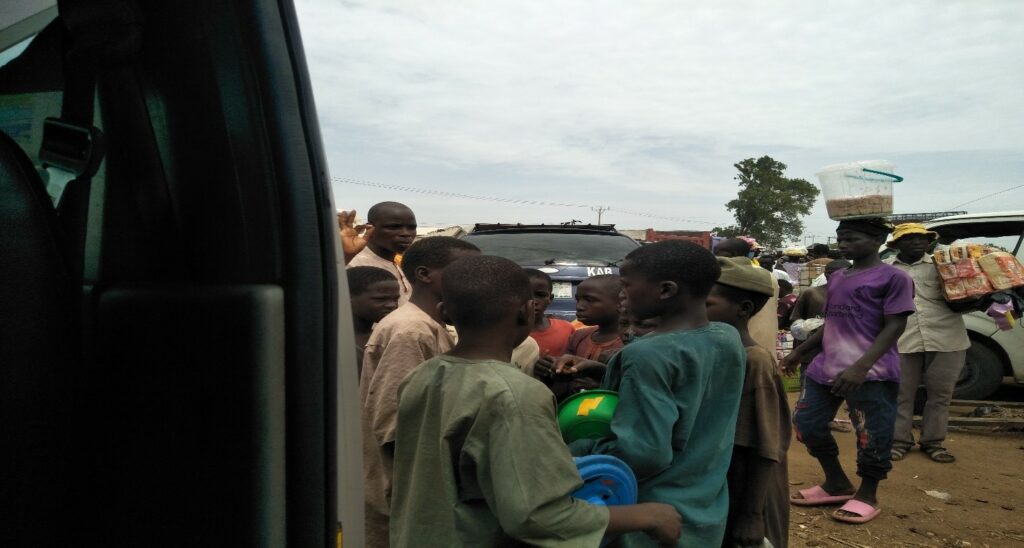
In Kano State, Nigeria, if you blink your eyes once, about three children or more would be standing in front of you with their bowls in hand and a pitiful eye crying to you for help. For these children whose average age is seven, any help is cherished as much as their bellies get something at a time.
This can be as little as the remaining drops of liquid in your just-consumed beverage pet bottle. This is not poverty porn. This is the reality of 837,479 out-of-school children in Kano State, according to a World Bank report.
The headache this reporter felt upon the sight of these children was probably what Buhari and his Minister of Humanitarian Affairs together with the Minister of Education felt when they decided to create the NHGSFP in 2016.
Former President Muhammadu Buhari-led administration, in its bid to attract more children to school, especially to primary education, created this scheme. Buhari and his team believed if the burden of feeding young children could be lifted off the masses, more children would be attracted and drawn to school. This would reduce drastically the 20 million out-of-school children in Nigeria.
The NHGSFP, according to the National Social Investment Management System (NASIMS), “was created to provide a nutritious and balanced meal to 5.5 million school children in grades 1 to 3″.
“The program aims to improve the enrollment of primary school children and reduce the drop-out rate, currently estimated at over 30%,” said NASIMS. The system also claimed poverty had been the reason for the over 30 percent drop-out rate in Nigeria.
Therefore, the NHGSFP was created to solve the problem of hunger and malnutrition which form the basic needs of schoolchildren. In order to cater for the needs of these children, over 44,000 cooks were engaged in the programme, and over four million students in 26 Nigerian states have been fed.
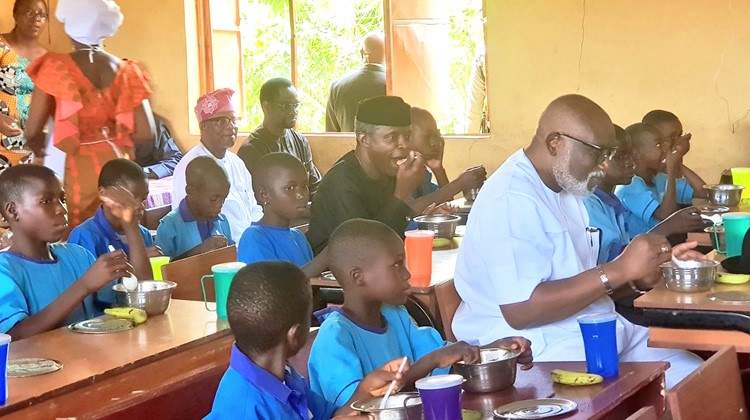
Chi Lael of the World Food Programme described the idea as the best in Africa. Taking a step further to put their money where their mouth was, WFP decided to partner with the Ministry of Humanitarian Affairs, Disaster Management and Social Development to provide technical support.
The aim of the support was to aid the Ministry’s efforts to digitalise its monitoring and evaluation system and scale up the development of the programme. Thanking WFP for its support, Sadiya Farouq, the immediate past Minister of Humanitarian Affairs, Disaster Management and Social Development, promised to “strengthen and sustain the programme so that it can continue to support the needs of the children, families, women and communities”.
Indeed, the school feeding programme is a commendable and innovative programme. However, like all things with the Nigerian Government and its innovations, this programme has experienced its own unique myriad of problems which threaten its continuity following the exit of former President Buhari.
Findings by FIJ showed that the absence of food vendors, poor quality of food served to children and small portions of food are among the myriads of problems threatening the sustainability of the school feeding programme. We discovered that Sadiya Farouq, in her capacity as minister, failed to deliver meals to these children six months prior to her exit from office.
During preliminary investigation for this report in January, FIJ randomly visited two different primary schools in Ile-Ife, Osun State. When FIJ arrived at these schools, the children were engaged in class or on break.
During our stay at these schools, FIJ never saw any food vendor in sight. “We’ve not seen them since last term,” said one teacher. “That is how they behave,” said another teacher. The head teacher of one of the schools even pointed our correspondent to some of the utensils used by the food vendors. They were gathering dust.
Not wanting to make a hasty revelation, FIJ waited for another five months before conducting another investigation. This time, we expanded our lens to cover primary schools in Lagos State, Oyo State, Kano State and Delta State. We discovered that not only were meals not served, food vendors were absent and students had stopped coming to school because the meals that had attracted them back to school were no longer being served.
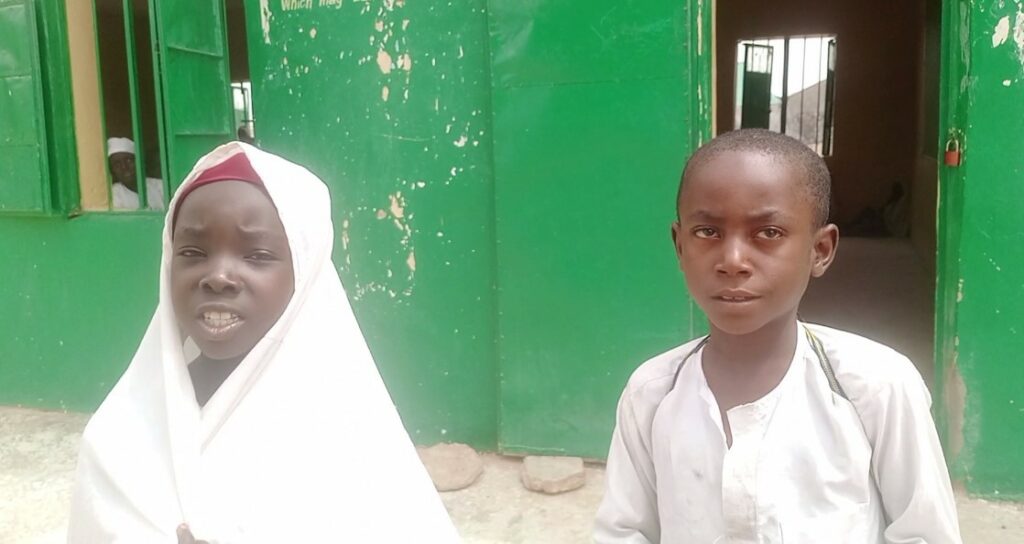
Khadija Mohamed Isa, 12, and Adamu Usman, 11, are both primary school students of Wailari Special Primary School, Kano State. The school is one of the beneficiaries of the NHGSFP.
Adamu Halilu, the school’s assistant head teacher, told FIJ that Khadija and Usman were two of the few students who were drawn to school as a result of the school feeding initiative. Khadija and Usman are also part of the resilient few who have stayed behind despite the absence of the meals in the last six months.
“We used to be many in class before, but now these students are no more coming because of the lack of food,” Khadija revealed to FIJ in Hausa. Her claim was backed by Usman, who has a dream of becoming a good man in life but is unhappy with the lack of food which seems to be a stumbling block to his ambition.
“Many boys and girls stopped coming to school because of food,” Adamu said. He believes the Federal Government should be held responsible for the absence of food vendors. “The government has not sent the money; that is the problem,” Adamu told FIJ. He believes there’s nothing hindering the food vendors from performing their duties but government’s inability to deliver funds.
Adigwe Martin, the head teacher of Okpe Primary School, Oshimili Local Government Area, Delta State, gave the same account of the feeding programme. The only little difference was that some parents still manage to send their wards to school in Delta despite the unavailability of meals, unlike in Kano where the choice of primary school education is rested on the school feeding programme. This is so because of the poverty level of parents in Kano is much higher when compared to Delta State. Adigwe, together with a member of his staff, told FIJ that the activities of food vendors assigned to Okpe Primary School began to fluctuate last year.
“This is a third term. They (food vendors) cooked sometimes in the first term, but this year, from January to May, none of them have come here to say they’re bringing food, because they have not paid them. They cook at home and bring to the school. They don’t cook here. They feed primary 1-3. I’m not saying they have done so badly, because the time FG released funds, there was a record for food vendors to mark attendance. The problem now is that salaries are not paid and they cannot cook with their money. They normally pay them monthly. The month they pay them, they come. The month they don’t pay them, they don’t come,” Adigwe told FIJ. Before the arrival of Adigwe to school that day, FIJ had randomly spoken to some pupils of Okpe Primary School to hear from them if truly the food vendors had not been coming. The claims of Adigwe matched the testimonies of his students. “The food vendors came only first term,” a student, who simply identified herself as Light, said.
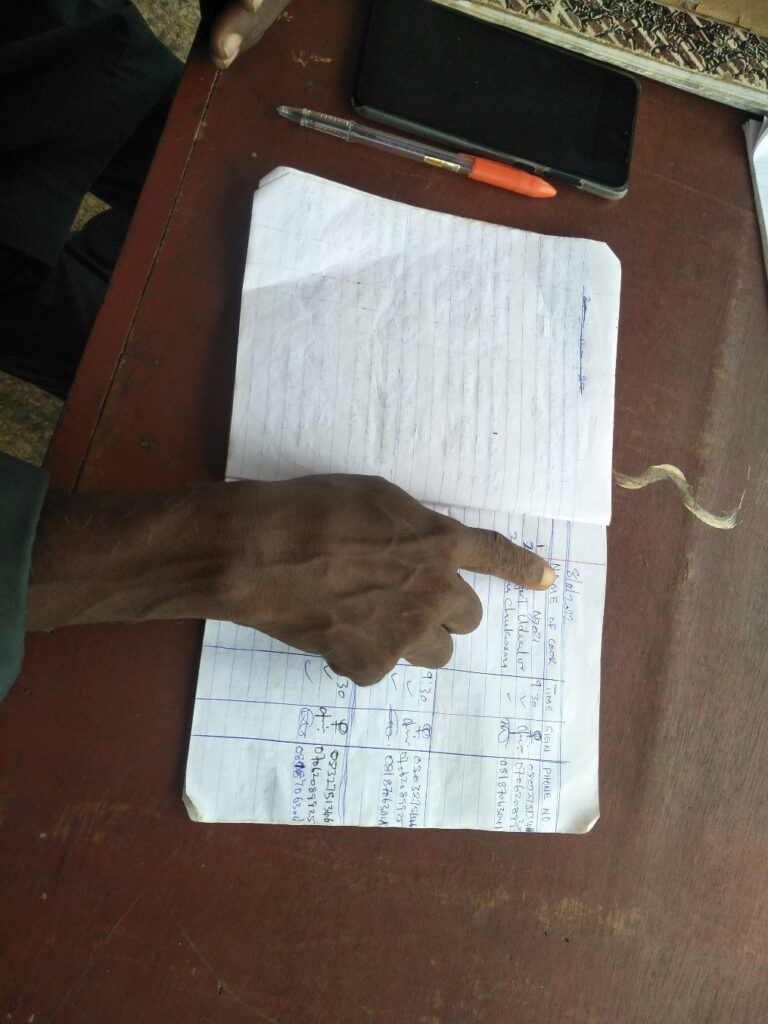
Food vendors are caterers assigned under the NHGSFP to cook and deliver food to primary schools whenever schools are in session. The idea of incorporating professional caterers into the programme has provided jobs for people like Isioma Chukwuoma. Isioma was engaged by the Nigerian Government in January 2017 to feed pupils of Okpe Primary School, Delta State. When FIJ spoke with her, Isioma couldn’t hide her unhappiness about her inability to continue to supply food for the primary school children she was assigned to. The paucity of funds has left her and her students virtually stranded. “When I see the children in the class I am feeding and I ask them if anyone is coming to feed them, they say no,” she told FIJ. “They have not paid us since last year, November. I don’t really know the reason. I’m not the only one affected. When I asked, they said they’d not paid anyone.”
At another school in Delta State, FIJ met Mr. Ebiye A. Patrick, a class teacher at Ani Nshi primary school, Aniocha South Local Government Area. Patrick revealed the food vendors stopped coming in August 2022. Although he commended the Nigerian government for coming up with such initiative, he implored the government to see ways the programme could be sustained.
“When they were coming, those children were happy because many of them were not eating at home. Some of their parents have no time to take care of their children. When a child eats, the child would listen more to what the teacher is teaching. When they were coming, they were giving them varieties. This made the children come to school because they knew that there’d always be food for them. They stopped around August last year. Since then, they’ve not been coming. When we asked why they’d not been coming, they said the federal government had not given them money,” he told FIJ.
Still in Delta State, FIJ visited Ahabam Primary School, Osihimili Local Government Area, where we met the headmistress, who declined to mention her name but granted us audience. The headmistress assumed office in January, and ever since, she has not set her eyes on any food vendor, talk less of seeing the children get fed. “We resumed school in January. They didn’t come from January till now. Everything is zero. Since you arrived, have you seen food?”
When FIJ placed a call to NASIMS contact centre on Thursday, May 25, we were notified that they were closed till May 31 because of the presidential inauguration coming up the following week. A week after, on June 2, the same call was placed to NASIMS phone number 018888148. At the dial of the number, we were told to dial ‘3’ for National Homegrown School Feeding Programme. After dialing this number, a representative who identified himself as Steve answered. We told Steve our reason for the call. “Kindly give me some minutes. Let me forward your call to the appropriate channel where you can get the right answers” Steve said, and then forwarded our call to a representative who identified himself as Mr. Kunle. “This is NPOWER department; we don’t have any relation with school feeding” was the response we got from Kunle. Apparently, Steve dodged our inquiry by forwarding our call to a different department.
In Shehu Musa, Kano, the assistant head teacher, Missions Primary School, took FIJ on a tour of some of the equipment/materials used by food vendors. As he did this, he told us how the school feeding programme increased enrollment of students into the school. “We benefited from this programme because enrollment increased as parents brought their students due to the food provided. We have eight vendors catering to the students. The last time the food vendors brought food was in the second term. In the second term, we had 13 weeks. They provided the food in only seven weeks of the term. They are saying the government is not providing the money to provide the food. We are in the third term. In this third term, we also have 13 weeks. We’ve spent three weeks and are currently in week four. In this week four, they’ve not brought food. The plates have spoilt with time because all the time we’re not using the plate. The vendors come with food, after which they go inside to distribute to the pupils. After use, they wash the plates and put them back in the school store,” Musa said pointing to the food cooler covered in dust. “As a result, this has decreased enrollment in our school. Some the pupils don’t come to school because they no longer get anything. The students are not coming, not because they don’t have money. For instance, each student is only expected to pay the Parent Teachers Association (PTA) fee of N100 per term. So, it’s not because of money that they’re not coming; it is because of the food they don’t eat very well.”
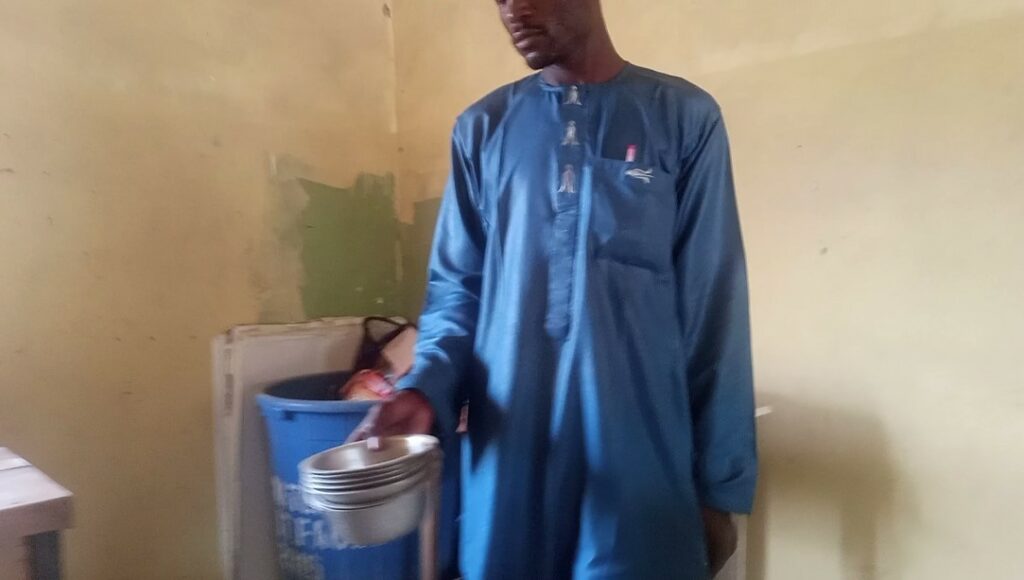
Primary school students of 512 Road Nursery & Primary School, Amuwo Odofin, Lagos, are not left out in this tattle tale. The children so much enjoyed the programme, and they even suggested to FIJ that the Federal Government include nursery school pupils. Speaking with FIJ, Emmanuela, a primary 2 pupil, said: “I want the government to extend the programme to nursery 2 pupils because their mothers cannot give them snacks or food, and this makes them hungry. The food vendors stopped coming in the second term. Before they stopped, they would bring rice, porridge, juice and eba. I did not like it when they stopped coming. I want the government to continue the programme.”
READ ALSO: FACT-CHECK: Yes, Nigeria Has Highest Number of Out-of-School Children in Africa
Congratulating President Bola Ahmed Tinubu on his inauguration, Dr. Michael Awoleye, a senior research fellow at Obafemi Awolowo University, gave an analysis of the inauguration speech by the President. Judging by his inauguration speech, he expressed confidence in President Tinubu on his ability to steer the nation to prosperity. However, he observed that in the inauguration speech, education and healthcare were not given priority. “What I read was that education is going to be sponsored by whatever is saved from fuel subsidy. Usually, fuel subsidy is always budgeted for every year. By the end of 2023, there’ll be no more budgeting for fuel subsidy. How then will this administration sponsor education if it is not given a priority? I want to advise that it is important for this current government tot have a rethink on how they want to sponsor education. Though I know education is a long-term investment, but then it is still very important” he said.
On the school feeding programme, Dr. Michael told FIJ how paramount the programme is reducing the drop-out rate in primary education. “Most of them come to school because they know they’re going to be fed. Their parents also would push them to school because they know that the burden of the breakfast and lunch would be off their budget. Indirectly, when they get to school, they would not just feed them alone, but as they feed the pupils, they’re also going to educate them so the literacy of the country would be increased that way. I want to encourage the government to look into this very closely and do the needful,” Dr. Michael, who also doubles as a research associate at the University of Johannesburg, told FIJ.
Finally, our investigation on this story took us to Oyo State, where we spoke with Mr. Odekunle, the head teacher at I.D.C Primary School, Alaka Ojoo. His testimony was not different from all we’d found. “The school feeding programme has been in existence for almost six to seven years. Let me say, this term (third term), we’ve not seen them at all. When we asked the food vendors why they’ve failed to read the pupils, they told us they had not received funds. The cause of the inconsistency of the programme is in the hands of the government,” he told FIJ.
Unlike the biggest objection to string theory as posited by Prof. Jess H. Brewer, with the strings in this story one can make a prediction on the NHGSFP, and these predictions can be tested in the foreseeable future. Having spoken with students, teachers and key actors of the programme, one can objectively predict the lack of sustainability caused by a lack of funds can lead to a reversal of impactful gains of the programme. Will the new government of President Tinubu come up with a solution or has the programme reached its end?
Subscribe
Be the first to receive special investigative reports and features in your inbox.


